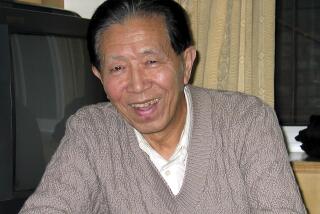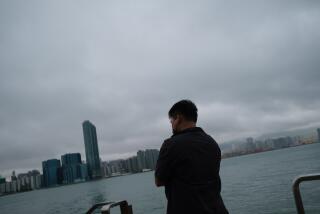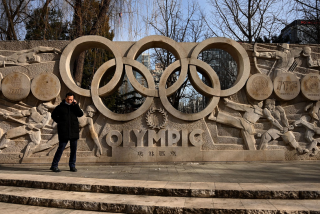Dissident Surfaces, Backs Beijing for Olympics : Asia: Wei Jingsheng ends rumors that he was being kept in isolation despite his release from prison last week.
- Share via
BEIJING — After a week of uncertainty regarding his whereabouts, leading Chinese dissident Wei Jingsheng surfaced Monday night at his Beijing family home vowing to continue his fight for democratic reforms and joining other intellectuals in support of China’s bid for the 2000 Olympic Games.
“I have no regrets,” said Wei, who was released from prison last Tuesday after serving 14 1/2 years of a 15-year term stemming from his activities in 1977-78 during the Democracy Wall movement, when dissident views were expressed in posters on the Beijing wall.
Wei’s reappearance in public Monday put an end to rumors that he was being kept in isolation by Chinese authorities fearful that he would say something to affect China’s candidacy for the 2000 Games. The 90-member International Olympic Committee meets Thursday in Monte Carlo to choose a site for the Games, and Beijing is a finalist along with Sydney, Australia; Manchester, England; Istanbul, Turkey, and Berlin.
Questioned by reporters, Wei, 43, slump-shouldered and suffering from what he described as a “heart condition” from his years in prison, joined a recent wave of Chinese dissidents who see the Olympic bid as a way of aiding reform efforts.
“I strongly hope China can host the Olympics,” Wei said. “This is a matter for 1.2 billion people, not of a certain (Communist) Party faction.” The endorsement from Wei, who criticized Chinese leader Deng Xiaoping in a famous 1978 essay calling for democracy as the “fifth modernization” necessary for meaningful reform, could be a boost for the Olympic candidacy.
Outside China, the Beijing Olympic bid is opposed by human rights groups, many Chinese exiles and members of the U.S. Congress, which approved a resolution opposing Beijing for the Games.
Inside China, however, the Olympic candidacy has gained support recently from prominent dissidents, including Wang Dan, 24, a student leader in the 1989 pro-democracy movement who served more than three years in prison after the June 1989 crackdown at Tian An Men Square.
“There are already signs that if China is not permitted to host the Games, conservative forces in the Communist Party will further stir up nationalistic, xenophobic sentiment and attack factions that have been closer to America and Europe,” Wang said.
In an odd dovetailing of interests, both dissidents and leaders in the Communist regime support the Olympic candidacy, each side convinced that it will benefit in the long run.
Thus, bitter opponents during the pro-democracy movement, such as Wang Dan and Chen Xitong, former Beijing mayor who is now president of the Beijing Olympic Committee, find themselves on the same side.
In the spring of 1989, Chen was a leader of the hard-line faction that called for military intervention to suppress the demonstrations, resulting in hundreds of deaths as the army moved into the city. Chen also urged stiff prison sentences for pro-democracy demonstrators.
“Of course,” Wang said in an interview, “I understand and sympathize with those overseas who oppose Beijing’s bid. I joined the 1989 movement and was shocked by the way it ended. But we have to bury our anger, think about the Chinese people and the future.”
Wei refused to comment immediately about his treatment in prison, including 10 years in a forced labor camp in remote Qinghai province. Asked if he had been beaten, he responded: “This is the kind of question we can talk about at length in the future. I might want to talk, especially on this subject, sometime.”
Under the terms of his sentence in 1979, Wei is now banned from political activity for three years.
“According to the law, I have lost my political rights for three years,” he said. “But I won’t stop completely.”
Tempest is Times bureau chief in Beijing. Platt is a Times researcher.
More to Read
Go beyond the scoreboard
Get the latest on L.A.'s teams in the daily Sports Report newsletter.
You may occasionally receive promotional content from the Los Angeles Times.






